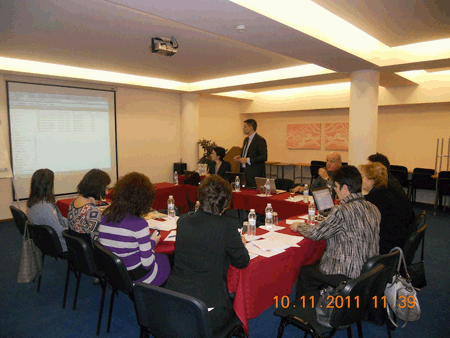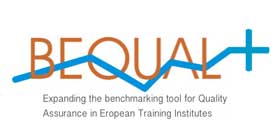News
20th
September 2013
Final conference of BEQUAL + project successfully held in Sofia
International conference put an end of two years of work for expanding BEQUAL benchmarking tool and community of practice for quality assurance in vocational education and training. The BEQUAL+ project was financed under EU Leonardo Da Vinci Programme (2011-2013) and brought together partners from Bulgaria, Italy, Turkey and Greece to transfer innovative techniques for self-evaluation of quality assurance practices in vocational education and training, quality benchmarking and networking. The innovative content transferred consists of electronic benchmarking tool for quality assurance in VET, offering opportunity for VET providers to compare their performance with similar institutions, web based quality sharing network and good practice center and thematic portal as a reference point for practitioners, researchers and policy makers in VET.
The partners presented the project activities and achieved results at the final conference, held on 20 September 2013 in Sofia, Bulgaria. Among the participants were VET providers, representatives of Bulgarian Ministry of Education and Science, Ministry of Economy and Energy, Office of the President of Republic of Bulgaria, educational experts, social partners, etc.
The functionalities of the BEQUAL Benchmarking Tool and Good Practice Center were demonstrated in details. The participants discussed the sustainability of the project results and their potential to be embedded in the VET quality assurance policies and practices.
We also presented of how our international cooperation provided opportunity for synergy between two EU projects (BEQUAL+ and EXPANDVET) that use the same platform www.bequal.info. Three representatives of EXPANDVET partners attended the BEQUAL + final conference and provided details on how we collaborated to learn from each other and to improve the innovative content.
May
2013
Comparative study defined the adaptation of BEQUAL benchmarking tool for the Bulgarian, Turkish and Italian users
The adaptation of BEQUAL benchmarking tool and Community of Practice that took place under the framework of BEQUAL + project had been based on Country Profiles fulfilling the role of background information for needs analysis and determining the main characteristics of VET systems in importing countries, existing approaches and gaps in quality assurance that needed be taken into account in the process of adaptation. They provided the basis for comparative analysis and for deciding the correct approaches for adaptation of the benchmarking tool.
Based on information provided by the partners from Bulgaria, Turkey and Italy, а comparative report has been elaborated to summarise the structure, content, and approaches for quality assurance in VET systems across the partner countries in order to identify the similarities, contrasts, and trends at national level that have to be taken into account in process of adaptation of the BEQUAL benchmarking tool.
The country studies and the comparative analysis reveal that the potential value added of the transfer of innovative instrument for benchmarking of quality assurance practices will be significant, as most of participating countries lack systematic national quality assurance approaches and established quality assurance practices consistent with the EQAVET recommendations. Only Italian VET providers seems to have access to mixture of well-established instruments for QA management, such as hetero-evaluation (ISO 9001-2000, the system of accreditation of training bodies (DM 166/2001) and the Model of accreditation ASFOR); self-assessment (system of indicators OECD-CERI, the CIPP Model, Model Self-Assessment Institute (Trento), the model evaluation of the Shares (ENAIP), the model for self-assessment Isfol structures of schools and training 34); mixed system (EFQM excellence and the Model Campus (CRUI), and accreditation.
The findings of the comparative analysis show that the potential users of BEQUAL benchmarking tool are quite diverse, as the institutions of VET systems in Bulgaria, Italy and Turkey are very different. This finding means that the benchmarking of different institutions from different countries requires agreement on common classification of the VET institutions that to be used in the adaptation of the tool.
The comparative analysis reveals also different progress in adoption of European Quality Assurance Framework for VET in the three countries. Bulgaria and Italy have established National Reference Points for quality assurance, while Turkey lags behind in this respect. Italy has adopted a National Plan for quality assurance in Education and Training, and Bulgaria has established an interdepartmental working group to the Ministry of Education, Youth and Science to elaborate quality assurance measures and actions in VET.
This means that project partners should elaborate their own strategy and to put different efforts to promote the use of EQAVET in their countries.
May
2013
BEQUAL tool piloting successfully accomplished
The piloting of the translated and adapted BEQUAL tool for benchmarking quality assurance in VET was completed successfully in April 2013. The purpose of the piloting actions was to test the application of the adapted benchmarking tool in the importing countries (Bulgaria, Italy and Turkey), to observe the feedback of the users in order to discover potential problems and/or errors, as well as to re-evaluate and improve the BEQUAL tool. We tested the technical performance of the BEQUAL platform, its functionalities, the relevance of the benchmarking methodology used, the need for further adaptations, as well as the exploitation potential.
In all, 139 VET providers from Bulgaria, Italy and Turkey participated in the trial. This was more than double in excess of the target numbers for the pilot and reflects the partners’ efforts for successful engagement and recruitment campaigns.
Partners designed the pilots in different format in order to reflect the regional specifics and to ensure the best working format of the trials. 3 piloting seminars have been held in Bulgaria in the period 15 February- 07 March 2013, with 76 participants - principals of VET high schools, colleges and managers of centers for vocational education and training. The locations – Plovdiv, Pleven and Sofia - have been selected to provide as much coverage of different types of regional VET providers as possible. In Italy, trials were designed as individual meetings with VET centers and Vocational schools, while our Turkish partner combined 2 workshops with face to face meetings. The venues were carefully selected to provide an access to large number of computers with internet connection, in order to allow for a large number of participants to test the BEQUAL tool online.
The feedback on the whole was very positive, although we identified some areas for improvement that were common to all partner countries. Among the best rated features of the BEQUAL tool was the structure of the benchmarking tool, quality of questions, instructions provided and convenience of using the tool. The main critics were related to the clarity and simplicity of questions, These issues have all been considered and will be addressed wherever possible.
The pilots provided clear indication for a significant long-term potential for utilization of the BEQUAL tool, as most of the VET providers have no experience of using assessment/benchmarking tools related to quality assurance in VET. At the same time, almost all of the participants in the pilots consider that the tool has a potential to encourage the involvement with the application of quality assurance in their VET organizations.
Project partners successfully used the piloting activities to building confidence in the final beneficiaries and to contribute for utilizing the significant potential for incorporation of quality assurance tools in VET.
You can follow the BEQUAL+ project on: www.bequalplus.info
https://www.facebook.com/pages/Bequal/559151644110165
http://www.linkedin.com/groups/Quality-assurance-in-VET-4940977
18th-19th
April 2013
4th partners meeting
The fourth project meeting has been successfully held in Empoli, Italy, on the 18th and 19th of April 2013.

15th-7th
February-March 2013
Great interest in piloting BEQUAL tool in Bulgaria
3 piloting seminars have been held in Bulgaria in the period 15 February- 07 March 2013. Their purpose was to test the application of the adapted benchmarking tool in Bulgaria, to observe the feedback of the users in order to discover potential problems and/or errors and to define the areas for improve the benchmarking tool. The seminars were held in Plovdiv, Pleven and Sofia and were visited by 75 VET providers (principals of VET high schools, colleges and managers of centers for vocational education and training). Having the questions, reactions, and follow-up conversations with the managers of VET institutions, we consider that there is a significant potential for incorporation of quality assurance tools in VET.
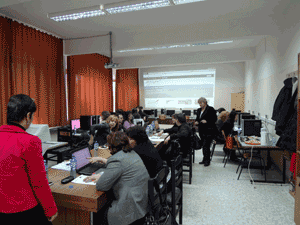
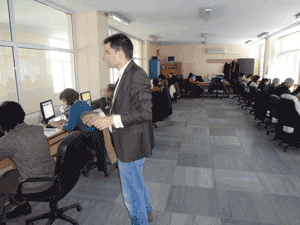
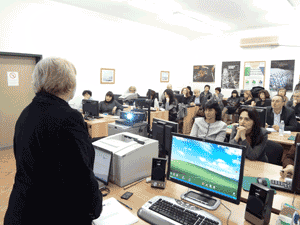
Jan-Mar
2013
Piloting of the Benchmarking tool in Italy
From January till March 2013 the piloting of the Benchmarking tool was done in Italy. 15 individual meetings with VET centres and Vocational schools of Tuscany were fixed and fulfilled. The meetings had place partly in locations of the VET providers and partly in ASEV's premises. One VET institution was interviewed telephonically and then by mail. So totally ASEV has managed to reach 16 VET centres and vocational schools from the following cities: Empoli, Florence, Pontedera, Pistoia, Livorno, Bagno a Ripoli, Prato, Colle di Val'Elsa and Genova, which belong to the following types of VET institutions: lower secondary vocational education and training – 4; post secondary non-tertiary vocational education and training – 2; higher vocational education – 4; further education and training – 6.
18th-19th
October 2012
3rd partners meeting
The third project meeting has been successfully held in Istanbul, Turkey, on the 18th and 19th of October 2012.
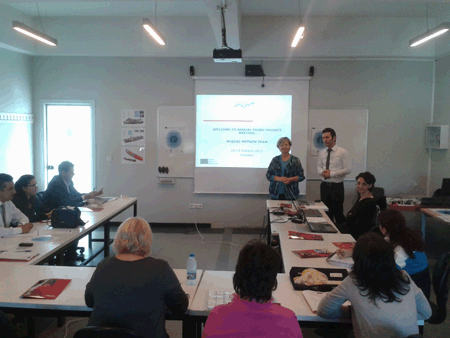
26th-27th
April 2012
2nd partners meeting
The second project meeting has been successfully held in Piraeus, Greece, on the 26th and 27th of April 2012.
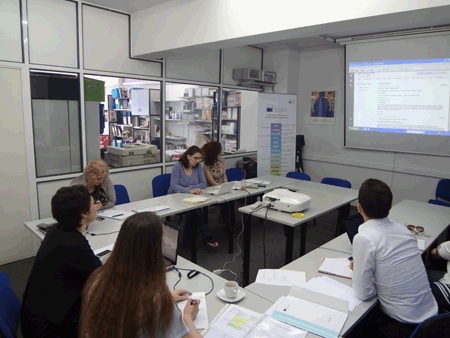
25th
April 2012
Comparative analysis
The comparative analysis based on elaborated country profiles and assessment of mismatches, shortages and gaps in quality assurance in partners countries has been completed.
April 2012
Short Country Study: ITALY
April 2012
Short Country Study: TURKEY
April 2012
Short Country Study: BULGARIA
6th
April 2012
Overview of EQAVET
10th-11th
November 2011
1st project meeting
The first project meeting has been successfully held in Sofia, Bulgaria, on the 10th and 11th of November 2011.
